The Weight of Decisions
Choosing between adoption and adventure
I am torn between two impossible choices.
Both are exciting ones, and for that, I’m grateful. It’s in the category of “good problems to have.”
I’m at this crossroads due to my heartache and loss. As I approach my 44th birthday, I have accepted that I will never have my own biological children, after three years of infertility and five miscarriages. Acceptance does not mean that I am, or ever will be, OK with this. I sob every time I say it out loud. I collapse every time it crosses my mind.
I will never know the sweet little face that reflects the perfect combination of my husband and me. I’ll never get to say, “He inherited his clever mind from his dad,” or “She got her mathematical aptitude from me.” I’ll never know which genes would win—Seth’s long, crooked toes or my straight, round ones; his eyes that match the sky, or mine, the color of a stormy sea; his apple-shaped body, or my pear-like physique? Would our son subconsciously wrap his fingers around his thumb when he’s anxious, like I do, or would he tuck his hand in the waistband of his pants while he rests, like my husband? Would our daughter giggle with delight like Seth, or chuckle to herself like me?
I will never have answers to these questions—a truth that stings the corners of my eyes and traps the air in my lungs. Yet somehow, the sun still rises and sets, the full moon dissolves into a crescent, and the snow melts into spring.
In what can only be described as a mid-life crisis, I’m suddenly spooked by the passage of time. How has it been thirty years since I started high school? Unlike earlier parts of my childhood, freshman year doesn’t feel that long ago. Is that really all the time I have left until I reach my parents’ age—the age at which my mom texted me to say that she’d fallen and couldn’t get up?
This is how I find myself today with Mary Oliver in my ear: “Tell me, what is it you plan to do with your one wild and precious life?”
I’ve wrestled with this question during the decades of my adulthood. I was smart and good at school, so I pursued my academic interests through five years of an (unfinished) PhD. I moved to the White Mountains and engrossed myself in the natural and cultural history of New England. I became a place-based educator, first at the college level, then as a high-school and middle-school science teacher, then leading programs for kids and adults through a local conservation organization. I imagined spending the rest of my life in northern New Hampshire, exploring these peaks and forests, teaching and writing about them.
Part of that picture was me being a parent. When I moved into my house in 2008 and installed a new tub, I imagined my kids splashing in it. I replaced the tiled bathroom floor with linoleum so their little feet wouldn’t get cold. I kept the old shack in the woods that would be their hideout. I bought leather sofas that would be impervious to crayon scribbles and juice spills.
I was 28 years old then.
Those dreams died one by one, as I divorced my first husband, abandoned my PhD, gave up a book contract, left one job after another, struggled with my mental health, then tried and failed to have a baby in my 40s after Seth and I got married.
The decision I face now is this: Do I bring children into my life through adoption at age 44 and pursue the dream I had at 28–the one where I spend my mornings chasing kids on tricycles down our quiet street, afternoons walking in the woods in search of salamanders, and evenings reading storybooks and bathing little bodies in the tub?
Do I still want that life?
Or do I want a different life—the one I tried out last year when I drove 14,000 miles to the Arctic Circle and back, camping under the midnight sun, exploring ice caves inside glaciers, sleeping in my van next to the Gulf of Alaska, chasing sandhill cranes down a rocky beach, watching salmon wriggle upstream to spawn, waiting for beluga whales to flow in with the tide, and writing about it?
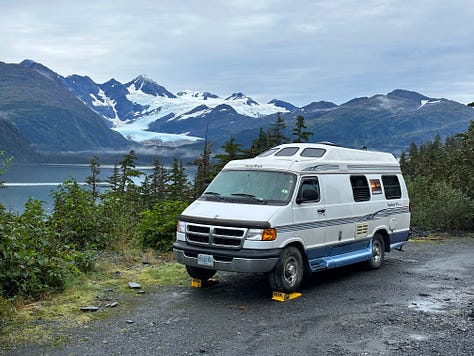
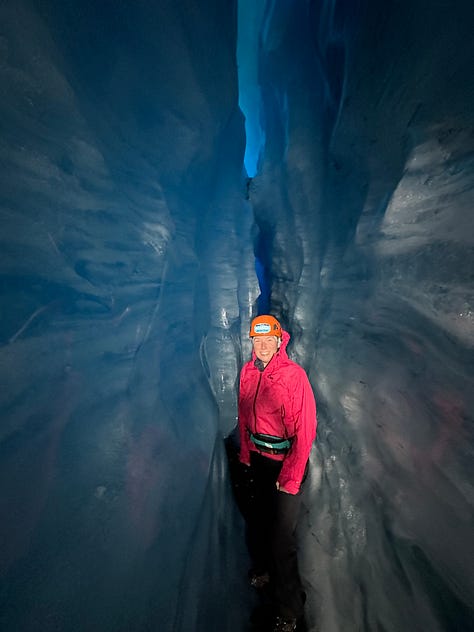
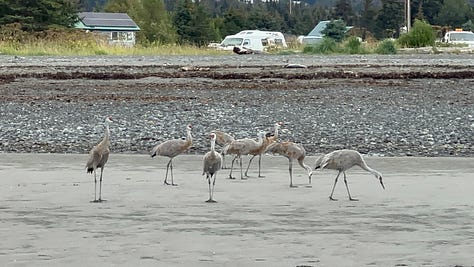
Are these lives mutually exclusive, or can I have both? Surely people have kids in Alaska, right? I know of a few families who travel full-time in RVs, homeschooling their children through trips to national parks and historic sites. That’s my dream.
I write this from the round wicker chair in the corner of my bedroom by the window looking out at a maple tree that sprung up through the lilac bushes. Two weeks ago, I closed this space off with double doors and planned to turn it into a third bedroom. We’ve been matched with two young children to adopt, a brother and sister in foster care, and we are trying to figure out if we can fit them in our house and in our lives. I thought I could give up the part of my bedroom I use for reading, writing, stretching, and staring out the window. But as soon as I had Seth hang the French doors I’d removed 15 years ago, I felt the walls closing in. I was anxious before I opened my eyes each morning, anticipating the view of the new wall where there had always been open, sunny space. After a week of this, I begged him to get rid of the doors to restore my space and my sanity. “If we have these kids, you’re going to have to build an addition,” I announced, without a hint of hyperbole.
We did the math and realized we can’t afford an addition anytime soon. The 1-year-old girl and 4-year-old boy would have to share a room.
A social worker visited this week so that we could review their case files. Seth and I had 60 minutes to read a folder of paperwork six inches thick detailing court hearings, medical records, and family history. I scribbled a few details in my notebook, but I wasn’t allowed to photograph or make copies of anything. My prospective daughter’s birth certificate and social security card would go back into a filing cabinet at the state office for safe keeping.
I’d spent weeks cleaning my house in preparation for the meeting—the first major scrubbing I’ve done since our home-study practitioner visited last year. In the hour that she sat in our living room, I doubt the social worker noticed that I had wiped the dust off the trim behind the dog bowls, washed the shells displayed in the bathroom, or vacuumed cobwebs from the corners of the ceiling. But my efforts were not in vain; I welcomed the incentive to declutter and deep-clean my home after months of neglect.
There’s a sense of satisfaction now that my space is clear. I’ve finally checked most of the items off my to-do list that have lingered since my return from Alaska. I’ve now been home for longer than I was gone. It’s amazing how differently 15 weeks can be lived, juxtaposing the greatest adventure of my life with a period of great disappointment and grief when the adoption match I returned home for last fall didn’t work out. Living the life of my dreams, then hurtling at 65 miles an hour back to the life I thought I’d escaped. Hoping my return would bring joy and opportunity, only to find more stress and sorrow.
Order clears my mind. It opens the space for creativity, inspiring me to write and reflect, if only because all the laundry has been washed and folded and put away and I have no more excuses. Am I prepared to trade my clear countertops for a sink full of sippy cups? Am I ready to have a four-year-old dump a bucket of toys on my living room floor while he runs around with Cheeto-orange fingers? Will I survive waking up at 5am to children’s squeals instead of lounging in bed all morning? Will my brain still work when I’m chasing toddlers for hours instead of sitting quietly at my keyboard? Would I be happier with a house full of life and love, or would the noise and chaos and exhaustion make me miserable?
My mind chases these circling thoughts, knowing that in a matter of weeks I’ll have to decide whether to bring these kids home with me. If we don’t move forward with the adoption, there is no reason for me to stay in New Hampshire. As soon as Baxter recovers from her surgery and it’s warm enough to dewinterize the Roadtrek, I could get back on the road.
Before our caregiver coordinator approached me about adopting these kids, I’d quietly started scheming my next trip. I traced the lines on my laminated wall map of North America, imagining the bumpy, dusty 500-mile drive on the Dempster Highway from Dawson City to Inuvik to Tuktoyaktuk on the Arctic Ocean. I ran my finger across the ferry route from Prince Rupert to Haida Gwaii, the island off the coast of British Columbia that someone said is majestic. I pulled out my copy of The Milepost, a guide to the remote roads I would travel to reach Canada’s Northwest Territories. I checked ferry schedules for the Inside Passage.
Daydreams of Alaska, the Yukon, and BC have consumed me in recent weeks. I’ll be unloading the dishwasher and drift back to the moment on the Haines Highway when alpenglow hit the snow-covered summit of Three Guardsman mountain. I’ll be lying on my yoga mat and remember the way the sun illuminated the yellow tundra sedges along the Dalton highway as dark sheets of rain fell at the edge of the horizon. I’ll be jogging around the block in my face mask and nanospikes and think of my trail run with the dogs in the Chugach mountains, where I could have disappeared into miles of alpine lakes if I’d had the time.
I’m indulging these daydreams by listening to James Michener’s Alaska, an epic of historical fiction that starts when mastodons crossed the Bering land bridge and details the waves of human migration from Siberia to North America, the diaspora of native groups across the Arctic, the invasion of Russian fur traders and the sale of the territory to the United States, the boom and bust of the Gold Rush, and the push for statehood. It’s a 57-hour audiobook that keeps me entertained for a half hour each night while I shower. Then there’s another story I treat myself to in the car called This Much Country, about a young woman who moves to Alaska, learns how to run sled dogs, and completes the 1,000-mile Iditarod. I love skijoring with Baxter and Laney harnessed to my waist, so it’s not that much of a stretch to get four more dogs and a sled, right?
I have a habit of checking the weather in Anchorage and Haines, to compare how cold and snowy it is compared to northern New Hampshire. It turns out there’s not much difference. Sometimes coastal Alaska is ten degrees colder, and sometimes it’s the same or milder. Besides the shorter daylight hours, maybe winter wouldn’t be too much worse up there? And I’d have a chance to see the northern lights for real, not just from the projector I point at my bedroom ceiling every night.
My interest in The Last Frontier borders on obsessive, and I worry I will regret giving up that dream to get stuck in this town another 15 years when I’m already sick of living here. In theory, I could still travel with kids or move, but the price of homes and RVs has doubled in the past few years, and I could barely afford the 1999 camper van that I cashed out my retirement to purchase last year. Can I cram a family of four plus two dogs in a van that felt cramped when I lived in it alone? Can my husband give up his job to travel with us, living off the rental income from our house? Can a toddler and a preschooler tolerate thousands of miles of driving? Could we ever afford to settle down somewhere else? And would we even want to be away, when our parents have waited so long for grandchildren?
I’d like to think I can combine my dreams of adventure and parenthood, but I realize it may not be realistic. If I choose to adopt young children, I may be defaulting to the life I planned at 28 rather than the life that unfurls before me at 44–the one I have worked my way towards for so many years, where I get to explore the world and write about it. What happens if I wake up when I’m 64 and realize that I missed my opportunity?
What is it that I wish to do with my one wild and precious life? Am I willing to trade deserts and glaciers for diapers and giggles? Sleep for snuggles? When I wake up on my 64th birthday, will I regret the things I didn’t see and do? Or will I regret not having a family of my own? Will my husband and dogs be enough?
I shared these thoughts with my friend Becky on a long hike the other day, and about halfway through our chat, I realized I’d had the same conversation with her on another hike last month.
“I’m sorry if I’m repeating myself,” I said, as we snowshoed through a thicket of balsam fir on the ridge. “I’m cycling through this conversation all day every day in my mind, and I can’t remember who I’ve said it to out loud!”
“It’s ok,” she reassured me, then asked, “Have you ever read the Robert Frost poem, ‘The Road Not Taken?’”
“Yes!” I exclaimed, having memorized it in high school. “I worry about the part where he talks about saving the first road for another day, but knowing ‘how way lead leads on to way,’ and he doubted if he would ever come back. I get stuck on the FOMO part”—the fear of missing out.
“But the whole point of the poem,” Becky reminded me, “is that it really doesn’t matter which road you choose. Either way will be fine.”
Frost did admit that the road not taken was “just as fair.” But he also concluded that choosing the less-traveled route is what “made all the difference.” So, which of my two paths was “more grassy and wanted wear?”
Most people settle down with jobs and kids. A lot of people dream of the freedom I have right now, being able to take off on a wild adventure. Few people follow that path in life, whether because of their commitments and circumstances, their fears, or the expectations society has put on them. I’ve waited decades to be able to do this. And I don’t know if I’ll have this chance again. I worry it’s unlikely to happen if I take on the responsibility of a family. If I’d gotten pregnant four years ago or fourteen years ago, that would be one thing. There’s a time limit on having biological children. But if I’m choosing between adoption and childlessness, do I have to make up my mind right now? Or can I follow my travel bug for a few years first?
I think about my life-coach training and what tools I would use if I were guiding my own client through this decision. What do I observe in my body? There is a tingling excitement when I think about being back on the road in two months. There’s lightness and energy in my obsession with Alaska. I’m eager to go through all my photos and notes from the trip last year and turn them into essays and a book. I’m thinking about all the things I missed and the places I want to see. I’m propelled by a desire to do this; to make it happen while I still can. To see where the road takes me. To surround myself with mountains and glaciers, eagles and grizzlies, salmon and belugas.
What is the energy I feel around parenting young children at this stage of my life? I feel heavy, anticipating the exhaustion, the long days, the temper tantrums, the messy house. I wonder how hard it will be on my physical and mental health if I can’t exercise and sleep in. I worry about feeling trapped and unable to get away. I fear waking up in 20 years and no longer being able to do the things I can do now, either because of my health, my finances, or because the world has fallen apart.
I went cross-country skiing with my friend Eurydice last weekend, and I shared all of this with her. She sensed my energy around it and said, “I really wonder if this adoption is the right thing for you now. I hope it’s OK to say that as your friend.”
“I know,” I told her when we paused at the top of the hill to catch our breaths. “After our last placement didn’t work out, Seth and I decided that we weren’t going to pursue another adoption match right away. We figured we’d give it another year or two, since there’s no urgency. If I were still trying to get pregnant, I’d have to do it now. But we can adopt anytime, even in five or ten years, if we change our minds. Then the caseworker sent me the picture of these two cute little kids, and I thought, what if this is our only chance? What if it’s meant to be?”
Eurydice paused as she thought carefully.
“After all you’ve been through, you’re coming from a place of fear right now,” she told me. “Don’t feel pressured to make this decision.”
I nodded. Despite my fears, something in me couldn’t say no when the photos of this little girl and boy popped into my inbox. I shared my hesitation with our caseworker, and she encouraged us to move forward. I asked if we could get to know the kids before making a commitment, and she said yes. We get to date then for a little while before we move in together and get married.
I joked about the marriage analogy to the kids' foster mom when we were on our way to our first visit last weekend, telling her that we were excited to get to know the kids, but we wanted to take things slowly. She texted back, “So should I take them out of their wedding attire?” I laughed and said I would change Baxter out of her bridesmaid dress, for now.
We spent a few hours chasing the kids around their foster home last weekend. Not surprisingly, they required constant attention and supervision. While I played airplane with the 4-year-old and Seth chatted with the foster parents, the baby crawled away, picked every kibble out of the dog food bowl, and tossed it into the water bowl. Foster mom picked her up, dumped the bowl in the sink, and refilled it without missing a beat.
“Will I ever have her superpowers?” I wondered. She also has four older boys.
My mom called on the drive home to ask how our visit went. “They’re little kids,” I said, glancing at Seth with wide eyes. “The boy is rambunctious, the baby is on the move. They’re really sweet, and I think they liked us.”
Part of the allure of adopting was that we might get to skip the exhausting phase of parenthood and go right to the fun stuff—hiking, helping with homework, having conversations about life. That’s why we were initially looking into teens. We reconsidered after our last experience, hoping young children might have endured less trauma and be more adaptable to new situations. The trade-off is diving into the most intense years of parenting, with zero experience.
Everyone says it’s worth it. Everyone says it goes by fast. “The days are long, but the years are short,” they say. Would I be fulfilled slowing down and seeing the world through the eyes of these two small children? Am I willing to sacrifice my own dreams so I can support theirs?
I have a few more coaching tools that I can use to explore this decision. One is to ask myself, “What perspective am I in right now about the adoption?”
At the moment, I feel like it will be hard. I think it will be exhausting. I’m afraid it will shrink my life down to these four walls and this small town. I worry I will feel trapped, like a butterfly in a cage that should be migrating to Mexico. I wonder if this brief reprieve in my mental health will spiral back into anxiety and depression.
So my perspective on adoption right now feels like being in a box in a dark basement. I am curled up. I can’t breathe. I can’t see. I can’t break free.
If I were my client, I’d ask myself, “Would you like to try on a different perspective?”
“Yes,” I’d say. “My current perspective doesn’t feel very good, and maybe there’s another way to look at things.”
Playing the role of my own client, I can brainstorm different perspectives and explore what those look like. It’s easiest and silliest to do this using random objects, and getting creative.
I’ll use the drinking glass that’s in front of me now. It’s an indigo-colored hand blown glass with flecks of peach and periwinkle that remind me of a school of fish in the sea. What do I know about a school of fish? They travel together, sensing each other’s movements and staying in sync. They protect one another.
What would this adoption look like from the “school of fish” perspective?
It reminds me that I wouldn’t have to go it alone—I’d have the support of friends, family, the kids’ foster parents, the preschool, and other parents I meet. I wouldn’t have to figure everything out by myself; I could draw on the wisdom of my community. I could put the little girl in daycare a few days a week while her brother is at preschool if I need some time to myself to read, write, and rest.
It also means that my family could work as a team, with the kids helping to keep the house clean, put their toys away, vacuum, and do chores. There’s also directionality to a school of fish. They’re going somewhere. This metaphor means that my family could work together towards a common goal, whether that’s visiting the national parks out west, or moving to Alaska.
Each fish in the school protects those around it. Likewise, if I put my energy into protecting and nurturing these children, they may help support me when I grow older. Even now, they are sure to teach me new things, show me the world through new eyes, and grow me as a person.
So the “school of fish” perspective feels a lot more supportive than the “trapped in a box” perspective. It motivates me to seek out support and opportunities. It reminds me that my family would be part of a generous community. It highlights that I would be not only giving but also receiving so much from having these children in my life.
It makes the adoption feel less scary; more manageable; more fun.
I could keep playing this game, trying on more perspectives, choosing my favorite, then asking myself, “What would I do, and who would I be, if I were living life from this perspective?”
As Eurydice and I skied through the woods last weekend, I asked her if she had read Into the Wild by Jon Krakauer. She said it sounded familiar. I reminded her that Chris McCandless had set out alone to live in the Alaska wilderness, but he realized within a few months that he missed having other people in his life. “Happiness only real when shared,” he famously penned in the margins of a book. But when he tried to hike out, he was trapped by a raging river and couldn’t escape. He starved to death in the old Fairbanks city bus he’d used as a makeshift camp, just 15 miles from the campground I stayed at in Denali National Park last year.
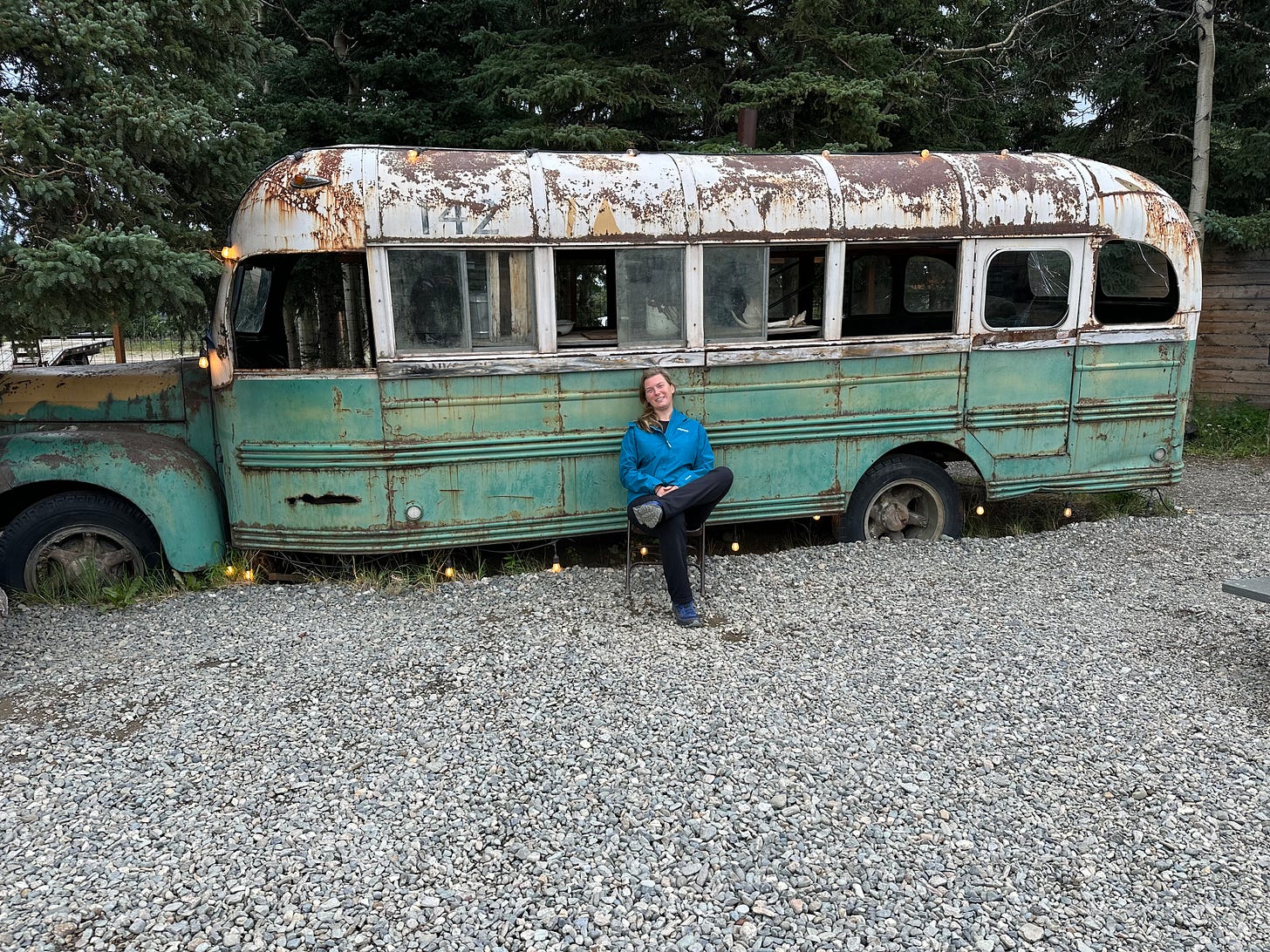
“I’m worried I’ll get tired of traveling alone,” I told Eurydice before I skied down the next hill. “Actually, my most joyful memory of my whole trip last year was sitting on the couch with my friend’s daughter in Denver, reading a bedtime story. That’s what inspired me to cut my trip short and come home when we were approved for adoption.”
Eurydice leaned forward on her ski poles. “Spend some time with the kids, see how it feels, and I think you’ll have your answer,” she told me. “You’ll know if it’s the right fit.”
“I hope so,” I said, before gliding down the snow-covered slope.
When Robert Frost faced “Two roads diverged in a yellow wood,” he stood and “looked down one as far as I could / to where it bent in the undergrowth.” And so I peer down the path of parenthood, hoping for a glimpse of what lies ahead. The plan is for Seth and me to take these kids on an outing this weekend (so we can learn how things like car seats and diapers work). If that goes well, we’ll invite them to our house for an overnight. We’ll get a feel for pushing a shopping cart full of hungry children around the grocery store. We’ll see if we can endure those 5am wake-up calls. We’ll make sure we can manage the temper tantrums. We’ll figure out if the snuggles and smiles are worth sacrificing our space and a little bit of our sanity. We’ll take things slowly, tiptoeing forward until we decide which direction to take.
This feels like a pivotal moment in my life. Like Robert Frost, “I shall be telling this with a sigh / somewhere ages and ages hence”—the moment my life diverged towards parenting, adventure, or… both?


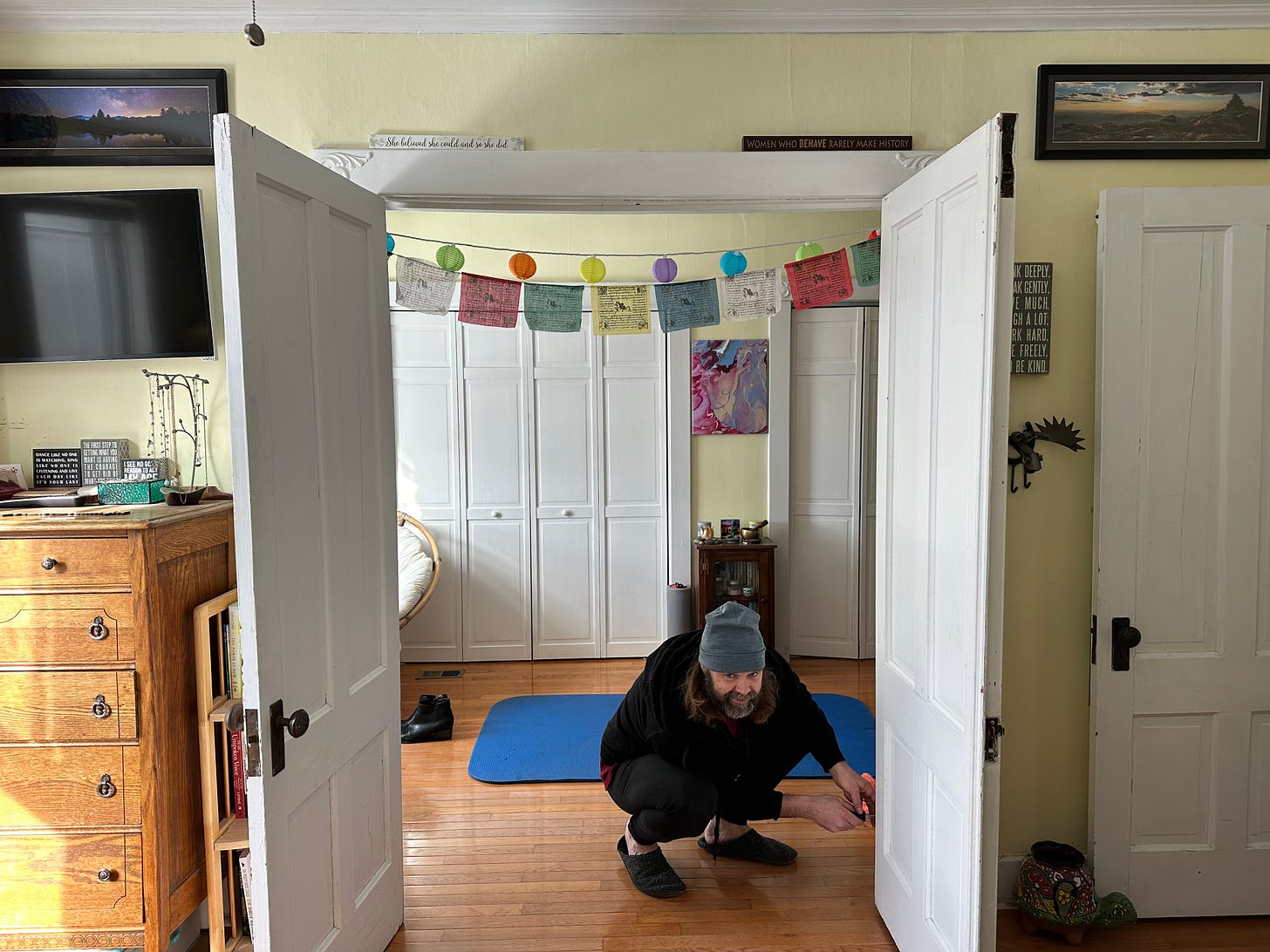
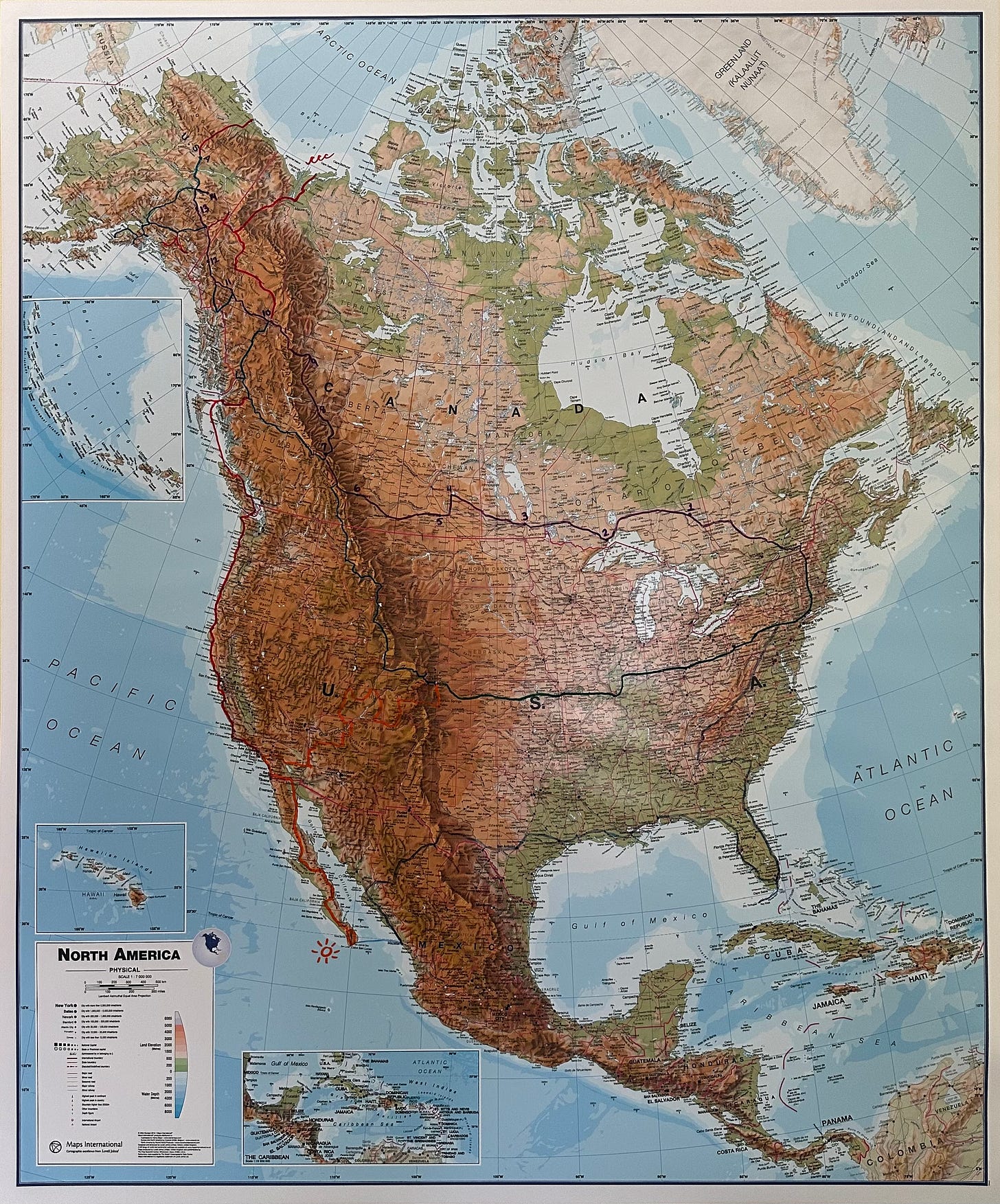
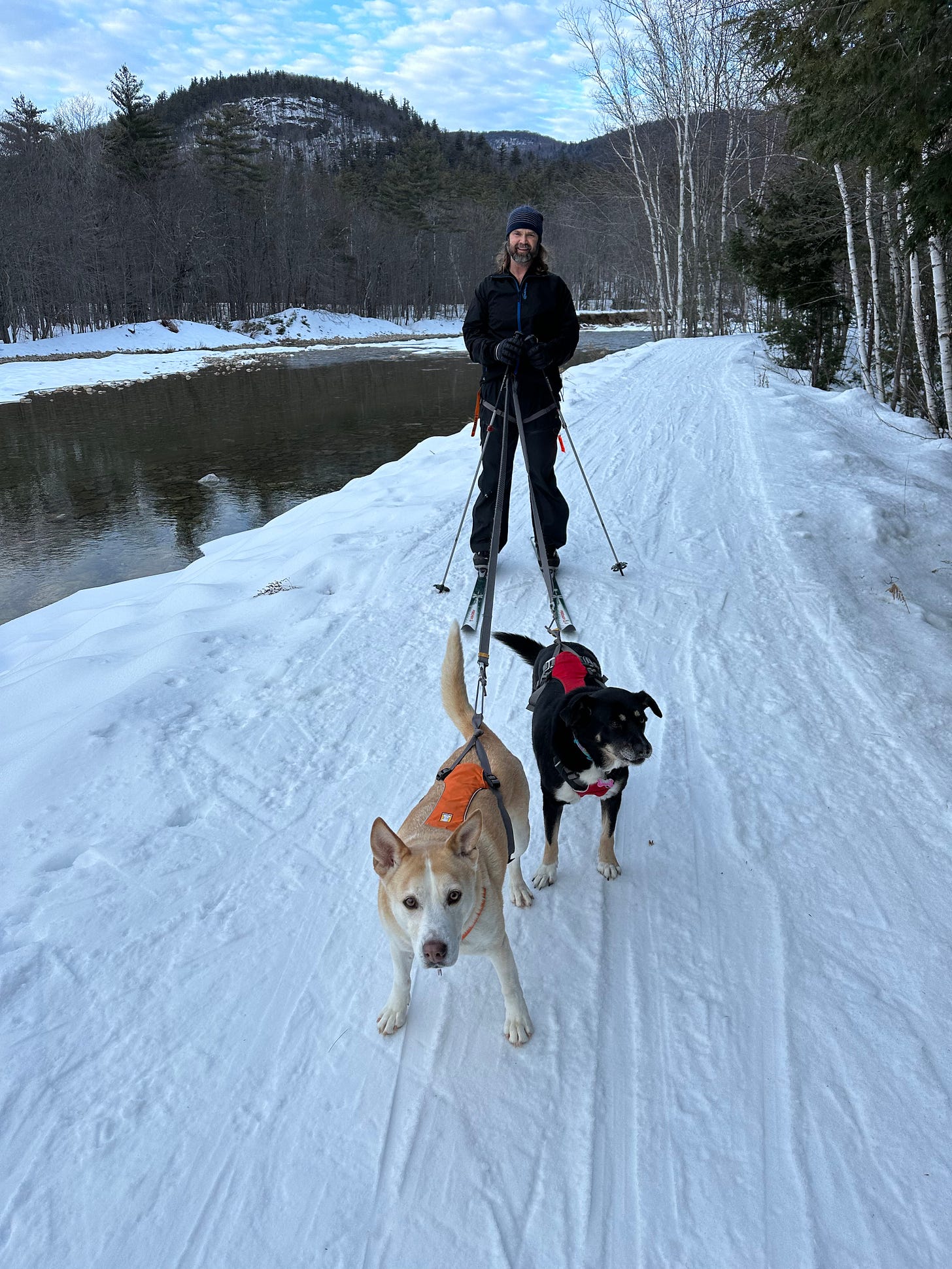





Eek! Pulling my hair out over here as I just spent an hour writing a long comment, wasn't signed in, forgot my password, and then lost everything I'd carefully written. Now I'm weighing the decision to just move on... try to re-write all I wrote... or just offer a recap.... DECISIONS... the topic of the DAY!
here goes....
As you know, I'm an adoptive mother of 2 via open adoption, adopted one at a time as infants about 3 years apart. Between these two we had an adoption that didn't go through after having the baby home for 10 days. We also had a chance to adopt two older children - siblings and the niece and nephew of my then husband. We ultimately made the impossible choice to say NO and then closed the door to adoption opportunities going forward.
At the time when our son came into our world, we lived out in the country, made our living as artists, had a horse, a dog, and just enough cats. Even though I married a guy who was nothing like what my younger self fantasized about, we were quite happy when our own childhood traumas weren't leading the show. I couldn't safely get pregnant naturally, we'd each imagined adopting kids one day since we were children, and we lived far away from anyone doing IVF at the time. Adoption was the natural choice. Open adoption was fairly new in the 90s, so we read all about it, interviewed people, and realized that was the only path that made sense to us.
Like you, I have a rich imagination. I thought love would be enough to conquer all. I fantasized about our kids loving the land like we did, making maple syrup with us, toiling in the garden and eating our fresh food with us, and being makers of things, curious about how it all works - just like us. I thought all of that was "nurture" vs "Nature". We would nurture that and it would be so.
God laughs!
Our son is deeply introverted and would pretty much prefer to do everything without us. He's a very bright, unique human with very clear preferences. He loves his cat, but is not so keen on us humans. He suffered from profound anxiety as a kid, had asthma and allergies, missed school often as a teen, and didn't sleep through the night till he was NINE YEARS OLD. I love him profoundly, and he was never the kid leaning over the car engine with his dad wanting to learn how it all works.
Our daughter came along and spent the first 17 years of her life pushing every button she could find - literally and figuratively. She came into the world with her arms braced in front of her energetically proclaiming "I DARE YOU TO LOVE ME!" She pushed me away so hard that most of my sessions in therapy and coaching through the years were about my relationship with her.
He's a braniac with social challenges. She's a social butterfly with learning challenges. Neither have any interest in horses, gardening, or making art. They find it interesting that we once made maple syrup. They don't even LIKE maple syrup. They tolerate one another, maybe even love each other, but don't find much comfort in their sibling relationship.
God laughs some more....
We now have 5 grandkids through our "bonus daughter" - the ex-partner of my partner's son. Three of those kids are my partner's grandkids (not biological, as his son is adopted too). The last two came from her current partner, but since neither parent has parents any longer, we asked if we could be their grandparents too. Why I tell you this is that this is more family by choice that wasn't anything like I fantasized. I wouldn't change a thing, and we dedicate much of our lives to supporting these kids and their parents in getting through some really tough stuff - much of it related to trauma the 3 older kids endured. The youngest of the 5 has a syndrome with vast challenges - one of which is that she'll likely never communicate with us. She is angel sweet, beats her head when she's unhappy, and she will never be able to say 'Mama'.
That fantasy life just never happened. Just like Alaska, there were moments resembling things I'd imagined, moments far worse than I ever let myself picture, and experiences far richer and more expansive than I ever could have dreamed.
But the fantasy? What my kids would love and the life we would share? Yeah... not so much.
We gave up our lives as artists, moved away from the country to have better access to support, and ultimately divorced because children triggered our own childhood traumas so deeply and we just could never find our way through. That may have happened without kids too, and it was a factor. Our Kids don't feel connected to the deep legacy in a property that has been in our family for generations. They just don't share many of the interests or concerns that I assumed would be part of the life of any child I nurtured into being.
I was willing to let everything go, partly because I have a deep history of codependence and sacrificing self for others. (No lie.) I had to commit to deep inner work so I wouldn't parent via resentment. I found work that deeply satisfied me and filled a need to do something I LOVED that would nourish me over a lifetime. I readjusted my expectations and hopes and dreams again and again and again. Everything about choosing to adopt changed the direction I thought my life would go. It gave me a life that I deeply love, that I'm often surprised to find myself living, and it helped me see that I just don't always have any true idea of what my life is going to look like.
I think the questions I would urge any person considering becoming an adoptive parent ask themselves are: Can I trust myself to care for myself emotionally if NOTHING goes according to my plan? Am I truly and honestly willing to change everything about what my life looks like if my child's needs require it? Am I willing to have them hate me, reject me, and push me away for years while I love them anyway? Am I willing to claim them as my own, even when they are nothing like me or my husband or my great Aunt Edna? Am I willing to do the INNER WORK required to not screw them up more than life naturally screws us all up? Am I willing to be surprised by life?
Of course... sometimes the fantasy plays out. Sometimes the imagination is more of a prophet than a dreamer. And sometimes the fact it DOESN'T go according to plan is the best thing ever! I wouldn't trade ANY of it for all the made read fantasies in the world - truly truly - and parenting, especially adoptive parenting, is not for those who will resent their kids for the road not taken. If you find that's you, saying NO is the choice of integrity and self-respect. If you don't believe it is you, then saying YES is the risk worth taking.
Whatever you two decide - We're rooting for you! xx
Two entirely different choices. One easy. One harder. Reading along I felt your anxiety / how joyful adventuring is for you. How frightening being suffocated by the children’s inevitable & exhausting demands. Whatever you choose you will succeed at. You are so gifted and deeply thoughtfulness. You won’t fail. You will choose the right road because both offer so much. All my best, Mimi